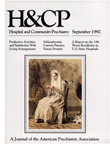Interpersonal Psychotherapy of Depressed HIV-Positive Outpatients
Abstract
In an open pilot study, 23 depressed adults infected with human immunodeficiency virus were treated using interpersonal therapy. Twenty subjects recovered from depression after a mean of 16 sessions. The authors discuss six aspects of interpersonal therapy that make it useful with depressed HlV-infected persons: psychoeducation about the sick role; a here-and-now framework; formulation of problems from an interpersonal perspective; exploration of options for changing dysfunctional behavior patterns; identification of focused interpersonal problem areas (grief, role transition, interpersonal disputes, and interpersonal deficits); and the confidence therapists gain from a systematic approach to problem formulation and treatment. Results suggest that mental health professionals should consider interpersonal therapy as a treatment for depressed HIV-positive patients.
Access content
To read the fulltext, please use one of the options below to sign in or purchase access.- Personal login
- Institutional Login
- Sign in via OpenAthens
- Register for access
-
Please login/register if you wish to pair your device and check access availability.
Not a subscriber?
PsychiatryOnline subscription options offer access to the DSM-5 library, books, journals, CME, and patient resources. This all-in-one virtual library provides psychiatrists and mental health professionals with key resources for diagnosis, treatment, research, and professional development.
Need more help? PsychiatryOnline Customer Service may be reached by emailing [email protected] or by calling 800-368-5777 (in the U.S.) or 703-907-7322 (outside the U.S.).



